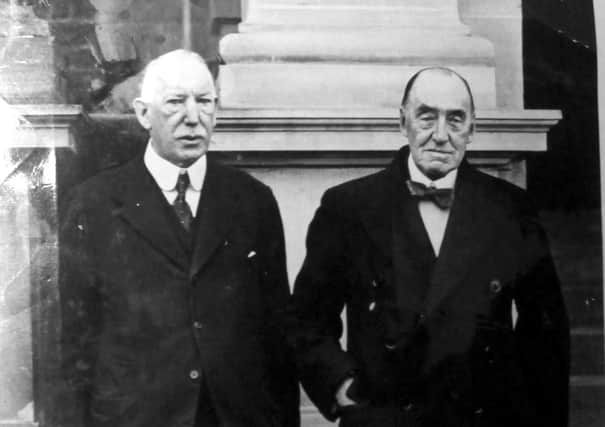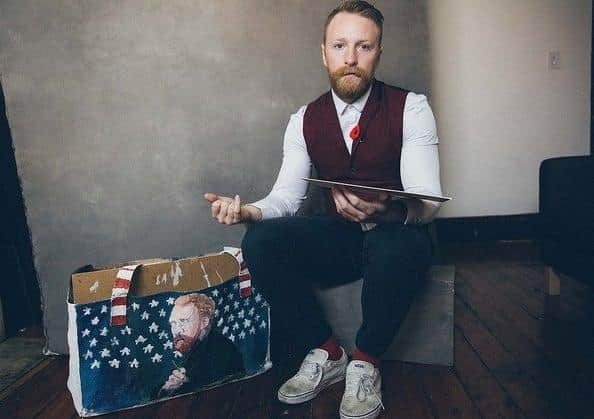Brian John Spencer: Official Ireland still excludes the British from its story, and so proves that partition was needed


Americans tell the story of taming the wilderness and laying down democracy across a continent.
The French speak of their cultural exceptionalism and human rights secured by the revolution.
Advertisement
Hide AdAdvertisement
Hide AdHere the Republic of Ireland tells their story of fighting off the British. A narrative that goes from top to bottom and right across society.


The story is carefully nurtured and cultivated and little dissent or deviation is tolerated.
By contrast, almost every aspect of life in Northern Ireland is scaffold by laws and regulations that work to strictly ensure that both traditions and communities are respected and represented. Even that is not enough for some — republicans frequently say that locations like Stormont and Roselawn don’t reflect their tradition.
To contrast further, beyond the one narrative that exists in the Republic, there is a worrying mainstream acceptability for bashing the British and unionist tradition and engaging in simplistic republican rhetoric and slogans.
Advertisement
Hide AdAdvertisement
Hide AdThe president of Ireland addressed the people on the need for the British to acknowledge their use of reprisals attacks and dehumanisation of the Catholic Irish by the British. But of course the IRA directed by Michael Collins 100 years ago engaged in all sorts of heinous reprisals attacks across the island and further afield.
And the Catholic Church and Irish republicans have a long history of demonising Protestants as ‘heretics’ and ‘aliens’ or ‘planters’.
The Taoiseach recently unveiled an exhibition on the hunger strike in Cork, with organisers envisaging that it would “educate youth about Irish freedom”.
Similarly the GAA has opened a museum in Dublin which tells only the republican story with no unionist input or contextualisation.
Advertisement
Hide AdAdvertisement
Hide AdThen you have an Irish teacher in China who taught his students English by teaching the chant, “Ooh, aah, up the RA! Ooh, aah, up the RA!’” As reported by Vice News.
Other reporting has looked at the trend among Irish young people on Facebook and TikTok to post pro-IRA memes.
There’s the example of the NewsTalk presenter Sinéad Ryan who wrote on Twitter, “I am Irish. We started 800 years ago and they’re still not fully gone!”
Could you imagine Tara Mills tweeting “No Surrender!”?
Who are ‘they’ and where have these narrow views come from and why are these sort of intolerant comments made so openly and without rebuke?
Advertisement
Hide AdAdvertisement
Hide AdThe GAA, for all its leadership and cross-community work in NI, expressed in its recent history programme stern words that clearly contradict the cross-community spirit it pursues in NI. “That afternoon in Croke Park has calcified in the nation’s collective memory as an example of Britain’s cruel inability to properly govern Ireland and made the GAA more than a sporting organisation.”
On a more general level, the soft culture of Republic of Ireland accommodates only one tradition. For example the 2013 film ‘Pubs of Ireland’ features only pubs that have a gaelic Irish hue.
Certainly there were no pubs with a unionist leaning. In this age of diversity and rainbow nations, why wouldn’t Official Ireland want to show the full range and colour of Irishness?
Perhaps tellingly, any time any Irish person embraces British culture they are excoriated on social media, and if unionist culture is shown it is often dismissed as ‘colonial’ and the people as ‘planters’.
Advertisement
Hide AdAdvertisement
Hide AdSimilarly, the recent publication ‘Old Ireland in Colour’ has received huge media attention, featuring in all the major papers and on TV.
Yet all the photos are of republican Ireland. There are no photos of regular unionist folk from Antrim and Down.
The photos of the 1912-1922 period feature Irish republican leaders, there are no unionist leaders. Any other photos are of the Black and Tans or the RIC, further restating and burnishing that ancient animosity.
This also sits beside an uncomfortable reality that is emerging — that of young people online and in life calling British people ‘Tans’.
Advertisement
Hide AdAdvertisement
Hide AdThe Irish Times reported on English people receiving abuse in Ireland, including an Irish lady raised in London. A bus driver in the midlands, she said, “I was assaulted back in May and had a tooth knocked out. I was robbed in February. I’m subjected to racial abuse on a near-weekly basis and called a ‘Tan’ and told to ‘go home’.”
I write this article in part because I have received similar comments when socialising in the Republic.
If the people who rail hardest on partition maintain a culture and environment that not only partitions and excludes but demonises unionist culture and history, then we must call out their hypocrisy.
As a last example, Screen Ireland is working on a production that looks at Michael Collins meeting with Lloyd George 100 year ago.
Advertisement
Hide AdAdvertisement
Hide AdThe Creator of ‘The Negotiator’ Colin Murphy has directly compared Michael Collins going to Downing Street as like when Gerry Adams went. That is most ominous for any unionist.
The more pertinent question is, Why don’t Official Ireland do a production looking at when Michael Collins and later De Valera met with the leader of unionism Sir James Craig in Dublin and London? Is it because that would bring too much nuance to our shared history? It is because Official Ireland wants to boil our history down to demonising the Brits?
Over 96% of Protestant clergy, their congregants and almost all leaders of business supported the unionist cause 100 years ago, and so they stood with James Craig and with the British. Partition was not some lofty sly move by the British imposed on the Irish. Partition was enacted as an act of self-determination by unionists, and as we can see by the absence of unionist culture in the ROI, self-preservation.
Why is the unionist tradition not included in Ireland’s story telling? You can not be anti-partition and at the same time partition the British-unionist tradition from Ireland.
Advertisement
Hide AdAdvertisement
Hide AdJohn Hume said that Ireland is not divided by geography, but by two traditions. Yet Official Ireland only accommodates one tradition. It educates Irish youth on one tradition. It makes the case for and buttresses partition and the division of this island.